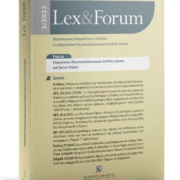This editorial has been prepared by Prof. Paris Arvanitakis, Aristotle University of Thessaloniki, Greece.
The European Regulations of Private and Procedural International Law are part of an enclosed legislative system. Since the early stages of European integration, third countries, and in particular the USA, had expressed their objections concerning the European integration process, questioning whether it reflects a “nationalistic” character, certainly not in the sense of ethnocentric provisions, since the European legislator had chosen the domicile instead of citizenship as the fundamental ground of jurisdiction from the beginning, but mostly because European law applied extreme provisions, such as the exorbitant jurisdiction, only against persons residing outside the EU, as well as the inability of third countries to make use of procedural options provided to member states (see Kerameus, Erweiterung des EuGVÜ-Systems und Verhältnis zu Drittstaaten, Studia Juridica V, 2008, pp. 483 ff., 497). However, the EU never intended a global jurisdictional unification. It simply envisioned a regional legislative internal harmonization in favor of its member states. Like any regional unification, EU law involves discriminatory treatment against those who fall outside its scope. But even when the EU regulates disputes between member states and third countries (for example, the Rome Regulations on applicable law), it does so, not to bind third countries to EU law -nor it could do so-, but to avoid divergent solutions among its member states in their relations with third countries. ?owever, as the issue on the relationship between European Regulations and third countries continues to expand, a precise demarcation of the boundaries of application of European rules, which often differ even within the same legislative text, acquires practical importance.
The “Focus” of the present issue intends to highlight these discrepancies, as well as the corresponding convergences between European Regulations of Private / Procedural International Law and third countries. During an online conference on this topic, which took place on the 29th of September 2022, we had the great honor to host a discussion between well-known academics and leading domestic lawyers, who have dealt with this topic in depth. We had the honor to welcome the presentations of: Ms. Astrid Stadler, Professor of Civil Law, Civil Procedure, Private International and Comparative Law at the University of Konstanz/Germany, who presented a general introduction on the topic (‘Ein Überblick auf die Drittstaatenproblematik in der Brüssel Ia VO’); Mr. Symeon Symeonides, a distinguished Professor of Law, at the Willamette University USA, , who presented an extremely interesting analysis on ‘An Outsider’s View of the Brussels Ia, Rome I, and Rome II Regulations’; Dr. Georgios Safouris, Judge and Counselor of Justice of Greece at the Permanent Greek Representation in the EU, , , who examined the application of the Brussels Ia and Brussels IIa Regulations in disputes with third countries, from the lens of the CJEU jurisprudence; Mr. Nikitas Hatzimichael ,Professor at the Law Department of the University of Cyprus, , who developed the important doctrinal issue of the exercise of judge’s discretion in the procedural framework of the European Regulations in relation to third countries; Ms. Anastasia Kalantzi, PhD Candidate at the Aristotle University of Thessaloniki who dealt with the key issue of European lis pendens rules and third countries; and, finally Mr. Dimitrios Tsikrikas, Professor of Civil Procedure at the University of Athens, who developed the fundamental issue of the legal consequences of court judgments vis-à-vis third countries. On the topic of the relations between European Regulations and third countries, the expert opinion of the author of this editorial is also included in the present issue, focusing on multi-party disputes in cases where some of the defendants are EU residents and others residents of a third country.
In the “Praefatio”, Mr. Nikolaos Nikas, Emeritus Professor at the Faculty of Law of the Aristotle University of Thessaloniki presents his thoughts on what is the “next stage on the path to European procedural harmonization: the digitization of justice delivery systems“. In the part of the jurisprudence, two recent judgments of the CJEU are presented: the decision No C-572/21 (CC/VO) regarding international jurisdiction on parental responsibility, when the usual residence of the child was legally transferred during the trial to a third state, that is a signatory to the 1996 Convention, , with a comment by the Judge Mr. I. Valmantonis, and the important decision No C-700/20 (London Steam/Spain), which is analyzed by Mr. Komninos Komnios, Professor at the International Hellenic University, (“Arbitration and Brussels Ia Regulation: Descent of the ‘Spanish Armada’ in the English legal order?”). Regarding domestic jurisprudence, the present issue includes the Supreme Court judgment No. 1181/2022, which demonstrates the incompatibility of the relevant provision of the new Greek CPC on service abroad with EU and ECHR rules, with a case comment by the undersigned, as well as a judgment of the County Court of Piraeus (73/2020), regarding the binding nature of the parties’ request for an oral presentation in the European Small Claims procedure, with a comment by Judge Ms. K. Chronopoulou. Finally, interesting issues of private international law on torts are also highlighted in the decisions of the Athens First Instance Court No 102/2019 and No 4608/2020, commented by Dr. N. Zaprianos.
Lex & Forum renews its scientific appointment with its readers for the next (eighth) issue, focusing on family disputes of a cross-border nature.




